| Listing 1 - 10 of 12 | << page >> |
Sort by
|
Book
ISBN: 9781405169585 9781405169592 Year: 2010 Volume: *1 Publisher: Chichester, West Sussex, U.K. : Malden, Mass. : Wiley-Blackwell,
Abstract | Keywords | Export | Availability | Bookmark
 Loading...
Loading...Choose an application
- Reference Manager
- EndNote
- RefWorks (Direct export to RefWorks)
World War, 1939-1945 --- Influence. --- Soviet Union --- Russia (Federation) --- History --- Guerre mondiale (1939-1945) -- Influence --- URSS --- Russie --- 1939-1945 --- 1925-1953 --- 1953-1985 --- 1985-1991 --- 1991-.... --- Histoire
Book
ISBN: 9780198725268 0198725264 0191038385 0191792608 Year: 2015 Publisher: Oxford : Oxford University Press,
Abstract | Keywords | Export | Availability | Bookmark
 Loading...
Loading...Choose an application
- Reference Manager
- EndNote
- RefWorks (Direct export to RefWorks)
The story of radio begins alongside that of the Soviet state: Russia's first long-range transmission of the human voice occurred in 1919, during the civil war. Sound broadcasting was a medium of exceptional promise for this revolutionary regime. It could bring the Bolsheviks' message to the furthest corners of their enormous country. It had unprecedented impact: the voice of Moscow could now be wired into the very workplaces and living spaces of a population that was still only weakly literate. The liveness and immediacy of broadcasting also created vivid new ways of communicating 'Sovietness' - whether through May Day parades and elections, the exploits of aviators and explorers, or show trials and public criticism. Yet, in the USSR as elsewhere, broadcasting was a medium in flux: technology, the broadcasting profession, and the listening audience were never static. Soviet radio was quickly earmarked as the mouthpiece of Soviet power, yet its history is also full of unintended consequences. The supreme irony of Soviet 'radiofication' was that its greatest triumph - the expansion of the wireless-listening public in the Cold War era - made possible its greatest failure, by turning a part of the Soviet audience into devotees of Western broadcasting. Based on substantial original research in Moscow, St Petersburg, and Nizhnii Novgorod, Russia in the Microphone Age is the first full history of Soviet radio in English. In addition to the institutional and technological dimensions of the subject, it explores the development of programme content and broadcasting genres. It also goes in search of the mysterious figure of the Soviet listener. The result is a pioneering treatment of broadcasting as an integral part of Soviet culture from its early days in the 1920s until the dawn of the television age.
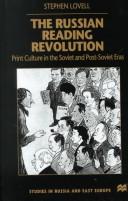
ISBN: 033377826X 0312226012 Year: 2000 Publisher: Basingstoke Macmillan
Abstract | Keywords | Export | Availability | Bookmark
 Loading...
Loading...Choose an application
- Reference Manager
- EndNote
- RefWorks (Direct export to RefWorks)
Books and reading --- Publishers and publishing --- Livres et lecture --- Editeurs et édition --- Editeurs et édition --- Book publishing --- Books --- Book industries and trade --- Booksellers and bookselling --- Appraisal of books --- Choice of books --- Evaluation of literature --- Literature --- Reading, Choice of --- Reading and books --- Reading habits --- Reading public --- Reading --- Reading interests --- Reading promotion --- Publishing --- Appraisal --- Evaluation
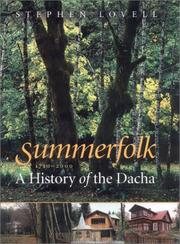
ISBN: 0801440718 1501704575 1501704567 9781501704574 9780801440717 1501704400 9781501704406 Year: 2016 Publisher: Ithaca, NY
Abstract | Keywords | Export | Availability | Bookmark
 Loading...
Loading...Choose an application
- Reference Manager
- EndNote
- RefWorks (Direct export to RefWorks)
The dacha is a sometimes beloved, sometimes scorned Russian dwelling. Alexander Pushkin summered in one; Joseph Stalin lived in one for the last twenty years of his life; and contemporary Russian families still escape the city to spend time in them. Stephen Lovell's generously illustrated book is the first social and cultural history of the dacha. Lovell traces the dwelling's origins as a villa for the court elite in the early eighteenth century through its nineteenth-century role as the emblem of a middle-class lifestyle, its place under communist rule, and its post-Soviet incarnation.A fascinating work rich in detail, Summerfolk explores the ways in which Russia's turbulent past has shaped the function of the dacha and attitudes toward it. The book also demonstrates the crucial role that the dacha has played in the development of Russia's two most important cities, Moscow and St. Petersburg, by providing residents with a refuge from the squalid and crowded metropolis. Like the suburbs in other nations, the dacha form of settlement served to alleviate social anxieties about urban growth. Lovell shows that the dacha is defined less by its physical location"usually one or two hours" distance from a large city yet apart from the rural hinterland-than by the routines, values, and ideologies of its inhabitants.Drawing on sources as diverse as architectural pattern books, memoirs, paintings, fiction, and newspapers, he examines how dachniki ("summerfolk") have freed themselves from the workplace, cultivated domestic space, and created informal yet intense intellectual communities. He also reflects on the disdain that many Russians have felt toward the dacha, and their association of its lifestyle with physical idleness, private property, and unproductive use of the land. Russian attitudes toward the dacha are, Lovell asserts, constantly evolving. The word "dacha" has evoked both delight in and hostility to leisure. It has implied both the rejection of agricultural labor and, more recently, a return to the soil. In Summerfolk, the dacha is a unique vantage point from which to observe the Russian social landscape and Russian life in the private sphere.
Country homes --- Maisons de campagne --- History --- Histoire --- Russia --- Soviet Union --- Russia (Federation) --- Russie --- URSS --- Social life and customs --- Moeurs et coutumes --- Social life and customs. --- Architecture, Rural --- Rural architecture --- Dwellings --- Park gate lodges
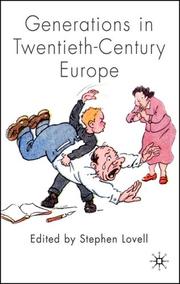
ISBN: 9780230008915 0230008917 Year: 2007 Publisher: Basingstoke Palgrave Macmillan
Abstract | Keywords | Export | Availability | Bookmark
 Loading...
Loading...Choose an application
- Reference Manager
- EndNote
- RefWorks (Direct export to RefWorks)
The concept of generation is ubiquitous in common parlance and public discourse: it is used to explain family relationships, consumer preferences, political change, and much else besides. But how can generation be used by historians? Do generations really exist, or are they constructed and manipulated by social and cultural elites? In pursuit of answers to these questions, this book ranges from World War I to the baby boomers and from Spain to the Soviet Union.
Generations --- Générations --- History --- Histoire --- Conflict of generations --- Intergenerational relations --- Geschiedenis van opvoeding en onderwijs --- handboeken en inleidingen --- Europe --- handboeken en inleidingen. --- Générations --- Intergenerational relationships --- Relations, Intergenerational --- Relationships, Intergenerational --- Interpersonal relations --- Age groups --- Gap, Generation --- Generation gap --- Generational conflict --- Intergenerational conflict --- Social conflict
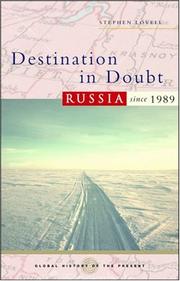
ISBN: 1842776649 1842776657 9781842776643 9781842776650 Year: 2006 Publisher: London Zed
Abstract | Keywords | Export | Availability | Bookmark
 Loading...
Loading...Choose an application
- Reference Manager
- EndNote
- RefWorks (Direct export to RefWorks)
This book is a short history of Russia since the collapse of Communism in Eastern Europe. In a matter of months, Russia was apparently demoted from "evil empire" to despondent poor relation of the prosperous West. Yet the country also seemed extraordinarily -- and alarmingly -- open to all manner of political outcomes: from the return of Communism to the creation and consolidation of liberal democracy. Many of the scripts written for Russia in 1991 have had to be drastically revised in subsequent years. This book is a historian's attempt to stand back from the turbulent post-Soviet era and inquire into the nature of the "Second Russian Revolution."
Social change --- Russia (Federation) --- Politics and government --- Social conditions --- #SBIB:328H262 --- Instellingen en beleid: Rusland en het GOS
Book
ISBN: 0191570494 1282336606 9786612336607 9780191570490 6612336609 9780191578960 0191578967 9780199238484 0199238480 9780191777165 0191777161 Year: 2009 Publisher: Oxford New York Oxford University Press
Abstract | Keywords | Export | Availability | Bookmark
 Loading...
Loading...Choose an application
- Reference Manager
- EndNote
- RefWorks (Direct export to RefWorks)
This introduction blends political history with an investigation into the society and culture at the time. Stephen Lovell examines aspects of patriotism, political violence, poverty, and ideology; and provides answers to some of the big questions about the Soviet experience.
Communism --- History. --- Soviet Union --- Politics and government. --- Social conditions. --- Politics and government --- History
Book
ISBN: 033373694X Year: 2000 Publisher: Houndmills : Macmillan,
Abstract | Keywords | Export | Availability | Bookmark
 Loading...
Loading...Choose an application
- Reference Manager
- EndNote
- RefWorks (Direct export to RefWorks)
Book
ISBN: 9780192574992 9780199546428 9780192575005 Year: 2020 Publisher: Oxford Oxford University Press
Abstract | Keywords | Export | Availability | Bookmark
 Loading...
Loading...Choose an application
- Reference Manager
- EndNote
- RefWorks (Direct export to RefWorks)
Russia in the late nineteenth century may have been an autocracy, but it was far from silent. In the 1860s, new venues for public speech sprang up: local and municipal assemblies, the courtroom, and universities and learned societies. Theatre became more lively and vernacular, while the Orthodox Church exhorted its priests to become better preachers. Although the tsarist government attempted to restrain Russia's emerging orators, the empire was entering an era of vigorous modern politics. All the while, the spoken word was amplified by the written: the new institutions of the 1860s brought with them the adoption of stenography. Russian political culture reached a new peak of intensity with the 1905 revolution and the creation of a parliament, the State Duma, whose debates were printed in the major newspapers. Sometimes considered a failure as a legislative body, the Duma was a formidable school of modern political rhetoric. It was followed by the cacophonous freedom of 1917, when Aleksandr Kerensky, dubbed Russia's'persuader-in-chief', emerged as Russia's leading orator only to see his charisma wane. The Bolsheviks could boast charismatic orators of their own, but after the October Revolution they also turned public speaking into a core ritual of Soviet'democracy'. The Party's own gatherings remained vigorous (if also sometimes vicious) throughout the 1920s; and here again, the stenographer was in attendance to disseminate proceedings to a public of newspaper readers or Party functionaries. How Russia Learned to Talk offers an entirely new perspective on Russian political culture, showing that the era from Alexander II's Great Reforms to early Stalinism can usefully be seen as a single'stenographic age'. All Russia's rulers, whether tsars or Bolsheviks, were grappling with the challenges and opportunities of mass politics and modern communications. In the process, they gave a new lease of life to the age-old rhetorical technique of oratory.
Public speaking --- Shorthand --- History --- Russia --- Politics and government --- Social life and customs
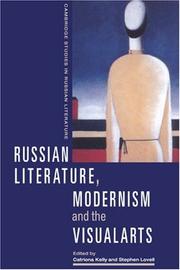
ISBN: 0521661919 Year: 2000 Publisher: Cambridge Cambridge University press
Abstract | Keywords | Export | Availability | Bookmark
 Loading...
Loading...Choose an application
- Reference Manager
- EndNote
- RefWorks (Direct export to RefWorks)
882 "19" --- Russian literature --- Modernism (Literature) --- -Modernism (Literature) --- -Arts in literature --- Crepuscolarismo --- Literary movements --- Postmodernism (Literature) --- Russische literatuur--20e eeuw. Periode 1900-1999 --- History and criticism. --- Arts in literature. --- 882 "19" Russische literatuur--20e eeuw. Periode 1900-1999 --- Arts in literature --- History and criticism
| Listing 1 - 10 of 12 | << page >> |
Sort by
|

 Search
Search Feedback
Feedback About UniCat
About UniCat  Help
Help News
News